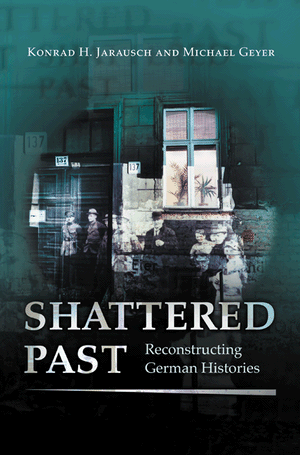Jarausch, Konrad J. and Michael Geyer. Shattered Past: Reconstructing German Histories. Princeton: Princeton University Press, 2003.
In this book, Jarausch and Geyer have attempted to set the new direction for writing twentieth century German history. Gone is the Sonderweg thesis; gone is national history; gone are master narratives of any kind. What the authors offer as replacement is a collage of German histories that come closer to truly representing what happened in Germany during the last century. Shattered Past offers new analytical and interpretive frameworks that the authors hope will help explain how Germany went from the devastating Third Reich to the prosperous Federal Republic of Germany.
At the heart of this book lies the contention that there are no master narratives that are adequate to explain Germany’s turbulent past. The title phrase “shattered past,” refers to the fact that Germany’s past is fractured politically, socially, and even geographically. The narrative of national history lost credibility when it was used for legitimizing mass violence by the Nazis. And while Marxist history sought to create an “emancipatory history” (61), it ultimately became nothing but the mouthpiece of the SED dictatorship in East Germany. Lastly, the authors assert that a liberal, progressive narrative – even one that ‘admits’ that the Great War, the Third Reich, and socialist East Germany were ‘detours’ – is not a satisfying narrative. Instead of seeing 1918, 1933, 1945, and 1989 as aberrations of a teleological German history, the authors ultimately conclude that “uncertainty might be the principle of twentieth century history rather than an abnormality to be explained away” (350).
While Jarausch and Geyer are leery of single master narratives, they do suggest a historical approach that they feel is most able to create these new, alternate German histories. By using the methodologies and approaches of cultural history, we may be able to rewrite German histories “from the margins to decenter received conceptions of what it meant to be German at a given time” (83). In this light, Jarausch and Geyer are interested in German identities. “Cultural history explores the ways and means by which individual and social bodies constitute themselves, how they interact with each other, and how they rip themselves apart” (15).
The book lays out seven themes that should act as “guideposts in deciphering the shifting map of territories and people that make up the twentieth century German past” (18). These themes include: war and genocide, the contested nature of German governance, the decline of German power in Europe, migration of German peoples, the struggle over German identity, competing visions of German womanhood, and lastly, the rise of consumerism.
By viewing Germany’s twentieth century past through these seven themes, we may gain a more complex, and thus accurate understanding of the shattered past. More focus would then be given to peoples that previous master narratives had marginalized, like women and homosexuals.
Women’s history would no longer be a separate “critical counternarrative,” but would be central to understanding the gendered nature of power and identity (247, 268). Part of these German histories would be the fact that national boundaries would no longer be as important, and people who still claimed a German identity but who did not live within Germany’s geographic borders (emigrants and refugees, for example) could still have an important place in their histories.
The book also has an interesting chapter on individual and collective memory in which the authors demonstrate that just as there are no adequate master narratives for historians, there is a vast array of personal narratives competing to make sense of Germany’s shattered past.
For more books on Modern German History, see my full list of book reviews here.

